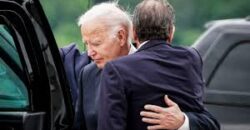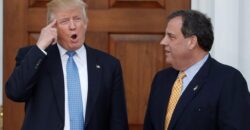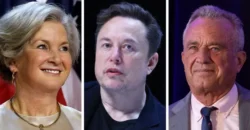https://www.washingtonpost.com/world/2024/11/06/trump-presidency-global-impact-us-election-winner/
Republican Donald Trump will face immediate challenges as the Israel-Gaza and Russia-Ukraine wars rage. What his election means for NATO, aid, trade and more.
America’s allies are also struggling to predict what’s next, as Trump promises to reverse what he sees as a lack of respect for the United States on the global stage with his “America First” approach. Trump’s history of overturning long-standing U.S. foreign policy, dismissing human rights abuses and cozying up to dictators is putting some leaders on edge. Here’s what a Trump presidency could mean for some of the issues most important to people across the globe.
Israel may be emboldened in widening Mideast war
Trump has broadly called for an end to the Israel-Gaza war but has not been explicit about what he sees as the path to a cease-fire. Privately, he has offered his support to Israeli Prime Minister Benjamin Netanyahu in the country’s offensives against Hamas in Gaza and Hezbollah in Lebanon — telling him in a recent call to “do what you have to do.”<img src="data:;base64,” alt=”” aria-hidden=”true” />
1/4
End of carousel
Many in Israel welcomed Trump’s first-term moves to relocate the U.S. Embassy from Tel Aviv to Jerusalem and to recognize the Golan Heights as part of Israel — decisions that incensed Palestinians and upended decades of American foreign policy. A second term could “embolden Israel’s efforts to move even more aggressively forward without any restraint,” Brian Katulis, senior fellow for U.S. foreign policy at the Middle East Institute, told The Washington Post. “I don’t think the cease-fire [in Gaza] is his priority,” James Carafano, a fellow at the right-wing think tank Heritage Foundation, who was part of the first Trump administration’s presidential transition team. “His priority is the defense of Israel,” Carafano added, and he will probably “not constrain Israel in any way in how it responds or threatens to respond” to Iran, Hezbollah or Hamas.
Trump signed the Abraham Accords in 2020, a set of treaties normalizing relations between Israel and four Arab states: the United Arab Emirates, Bahrain, Sudan and Morocco. He has said he plans to expand the accords when back in office, claiming that “everyone wants to be in it.” President Joe Biden’s attempts to broaden the accords have been stalled by the war in Gaza, with Saudi Arabia demanding a viable path to a Palestinian state before signing on.
Allies prepare for U.S. support for NATO to diminish
In his first term, Trump took a more adversarial approach with the transatlantic military alliance NATO, hammering members for what he said was their financial overreliance on the United States. He suggested on the campaign trail that he would encourage Russia to attack NATO countries that don’t increase their defense spending and may consider leaving the 75-year-old alliance originally designed to counter the Soviet Union.
European policymakers largely don’t believe Trump would withdraw, though his former national security adviser John Bolton has told The Post that “he’s never lost the desire to get out.” But few think he will maintain the status quo, either. Trump called for “fundamentally reevaluating NATO’s purpose and NATO’s mission” on the trail. Meanwhile, in Brussels, NATO members have quietly moved to Trump-proof the organization by signing decade-long defense pledges, increasing their defense spending and strategizing about how to adapt the alliance to a skeptic in the White House.
Europe worries about Ukraine aid, potential concessions to Russia
Both Trump and his incoming vice president, Sen. JD Vance of Ohio, have expressed deep skepticism over U.S. financial aid to Ukraine. “Every time that [Ukrainian President Volodymyr] Zelensky comes to this country, he walks away with $60 billion — he’s the greatest salesman ever,” Trump said this year. (Washington has provided more than $64 billion in military aid since Russia’s 2022 invasion of Ukraine started the largest land war on the European continent since 1945, while the European Union and the United Kingdom have together provided about $57 billion. Economic and humanitarian aid bring the contributions total much higher.)
Yet behind closed doors, many in Zelensky’s government see an upside in a Trump victory, complaining that the current White House is too cautious about avoiding escalation with Russia and that their requests for stronger weapons and looser restrictions on their use have been delayed or rebuffed. Some admitted, however, that they worry Trump would push Ukraine to make territorial concessions — which Zelensky’s administration has been adamantly against and would drive fresh splits within Europe. Trump has also boasted of being able to settle the conflict — now lurching into its third year — “as president-elect before I take office on January 20th.” He has offered no detailed plan.
The Kremlin has been outwardly cool about whom it wants in the White House, but Russian state media has been overwhelmingly flattering of Trump, who has touted a “very good relationship” with Russian President Vladimir Putin and may have spoken with him as many as seven times since leaving office.
Still, observers note Russia felt it did not greatly gain from the previous Trump administration, which ushered in a raft of tough sanctions against Moscow and disputes over the Nord Stream pipeline.
Democratic norms could be challenged
On the campaign trail, Trump has continued to praise dictators and openly flout democratic norms — suggesting the military could be deployed on U.S. soil against those he labeled “the enemy from within.” His rhetoric, including threats to a free press and previous actions such as withdrawing from the United Nations Human Rights Council, could have a chilling effect internationally with global freedom on the decline around the world, experts say.
Rachel Beatty Riedl, director of the Center on Global Democracy at Cornell University, cautioned that a second Trump presidency “would likely embolden and provide support for autocratic leaders,” pointing to his relationships with Hungary’s illiberal prime minister, Viktor Orban, who has co-opted the courts, and with Putin, who is known for silencing critics and maintaining a hold on power through pseudo elections. Trump often touts his ability to forge such relationships as a strength.
As Beijing becomes increasingly aggressive in its words and actions toward Taiwan, Russell Hsiao, executive director of the Global Taiwan Institute, pointed to Trump’s statements this year that raise doubt about his willingness to come to the island democracy’s defense and his misleading assertion that Taipei needs to pay the United States for defense. Such rhetoric could “fan the flames of skepticism” about American intent at a time when the Taiwanese are “directly threatened by [Chinese Communist Party] disinformation aimed at undermining U.S. credibility,” he said.
Trump, who has praised North Korean dictator Kim Jong Un, made similar comments that South Korea should pay for U.S. defense against a nuclearizing Pyongyang — which have sparked worry in Seoul.
U.S. could once again pull out of global climate agreement
Politicians seeking to tackle climate change globally — as extreme heat may make parts of Asia and Africa uninhabitable in decades — fear efforts could stall under Trump. He has mocked climate change as a “hoax” and rolled back or eliminated more than 100 regulations designed to protect U.S. land, air and water the last time he was president. This time, Trump has pledged to immediately reverse dozens of Biden’s environmental rules and policies and stop new ones from being enacted, and he asked oil CEOs to steer $1 billion to his campaign.
In a campaign document, Trump pledged to once again exit the landmark Paris climate accord — the main forum for nations to address the warming planet — arguing it placed an unfair burden on the United States. His pullout from the deal to reduce carbon emissions caused global alarm among climate scientists and experts, and Biden rejoined after his 2020 election. “We’re gonna do it again,” Trump said in a recent interview.
China braces for increased conflict over trade
For a second term, Trump has threatened to scale up economic attacks on Beijing and is considering measures that are widely viewed as likely to spark a global trade war. Trump has publicly floated the idea of enacting a 10 to 20 percent tariff on nearly all imports, in addition to privately discussing significantly increasing tariffs on Chinese imports by as much as 60 percent.
Economists from both parties say this could drive huge disruptions in the U.S. and global economies, far exceeding the impact of the trade wars in Trump’s first term. Proponents of Trump’s approach say tariffs can help return manufacturing jobs to the United States, but in the past, some experts have found they resulted in net job losses. An analysis from the Peterson Institute for International Economics found that his plan could cost the average American family more than $2,600 a year.
Wu Xinbo, director of the Center for American Studies at Fudan University, said that such moves would “severely damage trade ties between the two countries.” In China, high tariffs could result in “reduced exports, rising unemployment, slowdown in economic growth, shrinking GDP and weaker” Chinese currency. It would also “deepen the negative view of the U.S. among the Chinese public,” he added.
Latin America wary of potential ‘largest deportation in American history’
As polls showed voters broadly disapproving of the Biden administration’s handling of the border with Mexico, securing it was central to Trump’s campaign, which has repeatedly denigrated immigrants. He aggressively pursued policies to limit legal immigration in his first term — and his 2024 platform signals that he would do it again. Near the top of the Trump campaign’s agenda is a promise to “carry out the largest deportation operation in American history.” U.S. authorities lack the capacity to round up and deport millions of immigrants, but Trump said he’ll use National Guard troops.
The United States and Mexico, in particular, could feel “devastating effects” as a result of massive deportations, according to a paper written in part by researchers at the North American Integration and Development Center at the University of California at Los Angeles. The paper notes the two countries are “highly interdependent through dense migration, remittance and trade relations.”
Just ahead of the election, Trump said he would impose tariffs on Mexico — America’s largest trading partner last year — of between 25 and 100 percent unless it does more to stop migration north.









